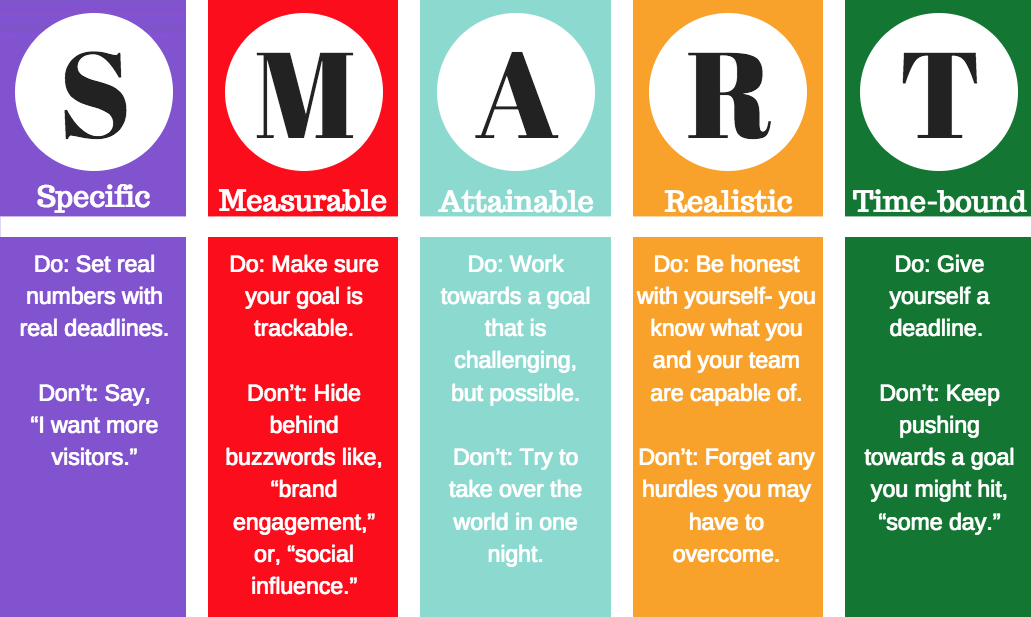Goal setting is considered to be the most important factor for achieving success in life. So there
are some golden rules for goal setting that you should keep in mind to set yourself up for success.
WHAT’S IN IT
How to set goals?

Goal setting is an art that everyone should master. If you are able to set goals but are not able to
achieve them, then you are lacking the art of goal setting. So, how to set goals? Below are the 5
golden rules goal setting that you should keep in mind.
5 Golden rules of goal setting
1) Set goals that motivate you
Not every goal that you have needs to be accomplished. If you are chasing a no. of goals at the
same time then it will become really difficult and frustrating to achieve them. Change goals that
you feel are meaningful that give your life a purpose. Your brain can only commit to goals that it
finds important and valuable.
Tips on how to set goals that motivate you.
● Note all your goals down. Rate them according to their relevance and the value they bring
to you. As the goals are now prioritized so prioritize your work accordingly.
● You can also do this by elimination method. In this method, you start by eliminating the
goals that are not worthy enough for you.
● Now, be aware of the benefits of achieving your goals. As a result, these benefits will help
you motivate yourself
● Attach your goals to your purpose and values. For example, if you feel like you are a
a person who wants to make this world a better place, then you should set goals that will
help you make this world a better place.
2) Set SMART goals

S – Specific
Your brain wants clarity in everything that you want to do. So when you are setting goals make
them as specific as possible. Specific goals will provide you with the exact direction in which you
need to move forward.
Tips on setting specific goals
● Define what exactly you want to achieve. For example, you want a promotion from
business development executive to business development manager.
● Define why you want what you want. For example, you want that promotion to boost
your passion and ambition or to earn more or to reach a better status.
● Define what you are required to achieve the goal. For example, for that promotion, you would
require to complete all your sales targets on time.
So here, your specific goal will look like this – “My goal is to get a promotion to business
development manager, by overachieving my sales targets, so that I can boost my ambition and
passion.”
M – Measurable
Now that you have set a specific goal, it’s time to make it measurable. The progress you make
can only be measured by quantifying it. Making it measurable will help you stay focused and
motivated as you would know how much you are lacking so you could make changes in your
approach.
Tips on making your goals measurable
● Define the amount of output you need to get to reach your goal.
● Continuing the previous example, the goal can be to over achieve your sales target by
15%.
● Keep a written record of your goal and progress so that you keep updating them as you
reach near to your goal.
So here a measurable goal can be – “My goal is to get a promotion to business development
manager, by overachieving my sales targets by 15%, so that I can boost my ambition and
passion.”
A – Achievable
Your goal should be attainable. Don’t get overexcited when setting goals because you might set
unrealistic goals which you can’t even achieve. Such a goal will make you frustrated and
demotivated to achieve them. So always have realistic goals.
Tips on setting goals that are achievable
● Ask yourself are your goals frustrating. Do you feel like you can achieve it in the
given period of time?
● If the goals are frustrating and you feel like you can’t achieve them in the given time then
it’s time to change the goal to something that is attainable.
● One way to make goals achievable is to simply break them into smaller parts. Break the
long term goals into short term goals.
So here, continuing the previous example, you should ask yourself can you get that promotion in
the time frame that you have set for yourself. And can you over achieve your sales target by
15%. If no, then reduce this number or break this goal into small parts and then try to achieve
them.
R – Relevant
Your goals should be relevant to your ultimate goals. Most people waste their time and energy
on tasks and goals which are not even relevant to them. If the goals are not relevant you might
feel discouraged because you will see zero progress in your end goal.
Tips on setting relevant goals
- Ask yourself are your short term goals worthy enough to help you reach your end goal.
- Make sure it is the right time to work on these goals.
- Compare whether the outcome of achieving these goals is worth the efforts you will put into it.
T – Time-bound
A goal is of no value without a deadline. A deadline helps you push yourself to achieve your
goals. A deadline will make you self-disciplined. So set a fixed date for the completion of your
goals.
Tips on setting time-bound goals
● Simply decide when can you achieve your goals and stay realistic in this approach.
● Continuing the previous example, attach a deadline to your goal of getting a promotion. It
can be the next six months or a year.
So here, your final goal can be – “My goal is to get a promotion to business development
manager by the end of the upcoming 6 months, by overachieving my sales targets by 15%, so that I
can boost my ambition and passion.”
Setting SMART goals is considered to be the most important golden rule for goal setting.
3) Write your goals down

Now that you know how to set goals that motivate you and how to set SMART goals, it’s time to
write these goals down. Studies have shown that people who write their goals have a 97% more
chance to achieve them as compared to people who don’t write their goals down.
By writing down your goals you are putting a picture of your vision in front of you. It will act as
a guide and a reminder of your goals.
Tips on how to write your goals down
● Write your goals on a sheet of paper with your own hand. Like don’t write them on an
electronic device.
Read them on a regular basis in order to remind and motivate yourself.
Write both short term and long term goals.
Write your goal as a positive statement. For example, I will contact 20% more prospects
every day in order to overachieve my sales target.
4) Make an action plan

The next golden rule of goal setting is to prepare an action plan.
So till now, you have written all your goals down and it’s time to make a detailed action plan.
How would you feel if you had a clear destination but did not know how to reach there? You will
feel really demotivated.
This is the same thing that happens with your goals if you don’t prepare an action plan. With an
the action plan you can prepare every step in advance that is required to be taken to achieve your
goals.
Tips on how to prepare an action plan
Identify all the tasks that need to be done to achieve your goals.
Write to each and every step required to be taken.
Identify the resources you might require in performing the tasks. Gather these resources
before or at the time of performing the tasks.
● Identify which tasks can be delegated.
● Keep reviewing and updating the action plan.
Learn how to prepare an action plan in detail
5) Stick with your goals and plans
The next most important thing after goal setting and making the action plan is to take the action.
Now what might happen is that you will start to feel that the action plan is not good enough if
your goals are not good enough. To overcome this challenge all you need to do is stick with it. In
other words, you need to develop self-discipline and keep working towards your goals.
Tips on how to stick with your goals
● Read your goals and action plan on a daily basis.
● Remind yourself of your purpose behind achieving this goal so that it keeps you
motivated.
● Remind yourself of the benefits of achieving your goals.
● Start your day with the most valuable task. It will give you a kick start.
● Set a fixed period of time for reviewing your goals.
Conclusion
In conclusion, we can say that goal setting is one of the most important factors that make a big
difference in your success. Always set a goal no matter what. Start by setting goals that will help
you accomplish something valuable to you. Make these goals as specific as possible. And don’t
forget to stick with them.
Also you can read our blog on Time Management: How The Pickle Jar Theory Will Help You
FAQ’s
Goal setting the process of creating a plan of action for achieving the objectives and
completing the tasks in the specified time frame.
It will give both a long term and short term vision.
It helps in boosting your self-esteem. When you accomplish your short term goals you
will feel proud of yourself and eventually it will build your self-esteem.
Helps in reflecting on your values and purpose in life.
It gives you the direction for achieving success so you can focus on them.
“Creating your best life” by Caroline Miller
“Your best year ever” by Michael Hyatt
“9 Things successful people do differently” by Heidi Grant
“Big potential” by Shawn Anchor
‘Goal setting” by Thibaut Meurisse
Yes, without goal setting no one can become successful. You need to know where you
are supposed to go before you head towards it. Always remember goal setting is the most
important task before you dream of success.
Decide exactly what you want to achieve.
Break the goal into small parts
Decide the tasks you need to do to accomplish your goals
Make an action plan
Implement the action plan



